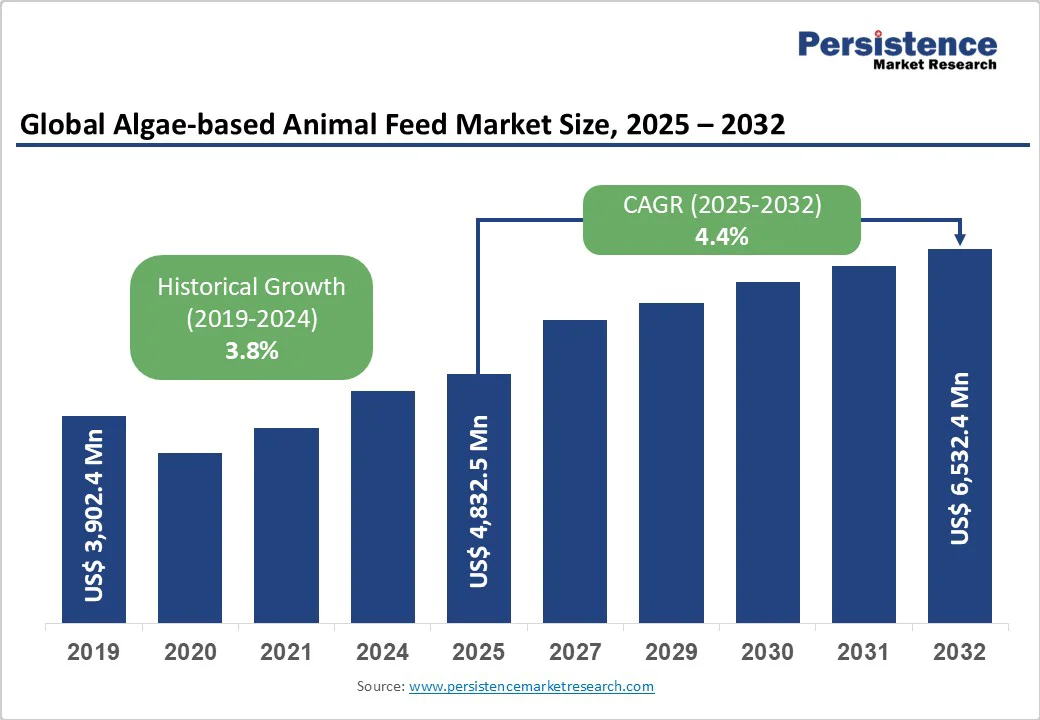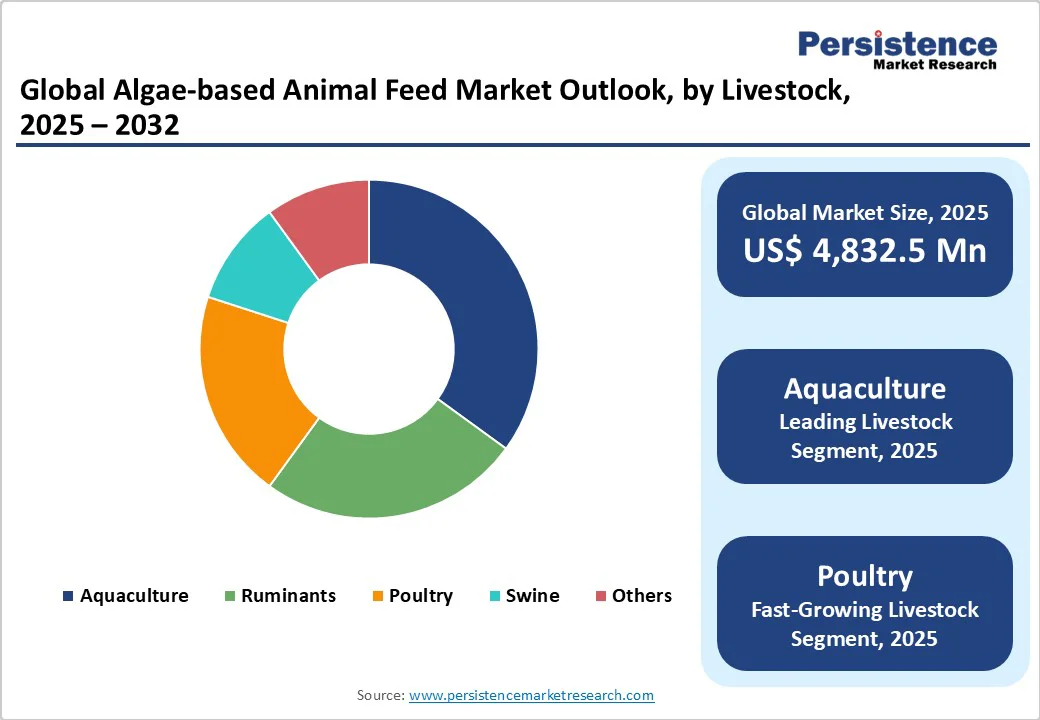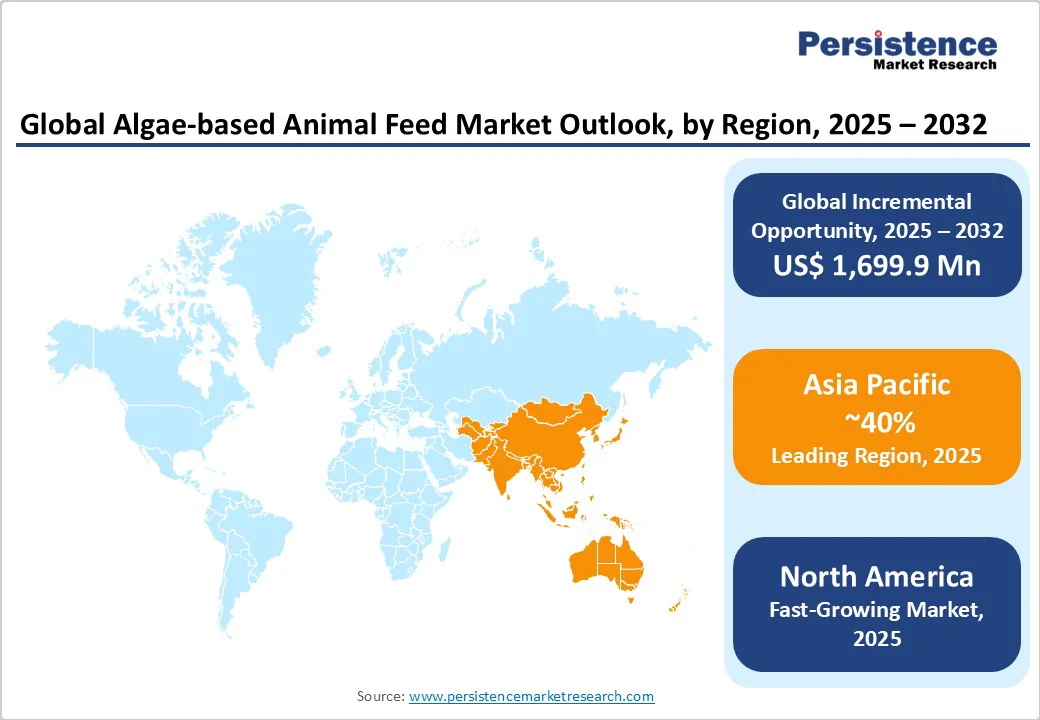ID: PMRREP33699| 194 Pages | 23 Oct 2025 | Format: PDF, Excel, PPT* | Food and Beverages

The global algae-based animal feed market size is likely to be valued at US$ 4,832.5 Mn in 2025 and estimated to reach US$ 6,532.4 Mn by 2032, growing at a CAGR of 4.4% during the forecast period from 2025 to 2032.
The algae-based animal feed market is experiencing consistent growth, propelled by the rising demand for sustainable feed alternatives, increasing global livestock production, and growing environmental concerns over traditional feed sources such as soy and fishmeal.
Algae-based animal feed, rich in proteins and omega-3 fatty acids, supports animal health and reduces environmental impacts, making it a preferred choice for eco-conscious agriculture.
| Key Insights | Details |
|---|---|
| Algae-based Animal Feed Market Size (2025E) | US$ 4,832.5 Mn |
| Market Value Forecast (2032F) | US$ 6,532.4 Mn |
| Projected Growth (CAGR 2025 to 2032) | 4.4% |
| Historical Market Growth (CAGR 2019 to 2024) | 3.8% |

One of the primary drivers of the algae-based animal feed market is the global shift toward sustainability in agriculture and livestock production. Unlike traditional feed sources such as soy or fishmeal, algae can be cultivated with minimal land and water resources, making it an eco-efficient alternative that produces high yields of nutrient-rich biomass.
This reduces pressure on arable land and helps address concerns of deforestation linked to soybean cultivation, as well as overfishing tied to fishmeal production. Algae cultivation generates significantly lower greenhouse gas emissions compared to conventional feed production, directly supporting global climate change mitigation goals.
As governments, regulators, and consumers increasingly demand environmentally responsible practices, algae-based feed is gaining traction among producers who seek to align with sustainability certifications and eco-labeling standards. In addition to environmental benefits, algae provide a consistent and reliable source of essential nutrients such as proteins, omega-3 fatty acids, and antioxidants, ensuring both animal health and productivity.
This combination of ecological responsibility and nutritional efficacy makes algae-based feed an attractive solution for meeting the evolving demands of a more sustainable global food system.
A major restraint in the algae-based animal feed market is the comparatively high cost of production, which limits its competitiveness against conventional feed options. Algae cultivation, whether through photobioreactors or open pond systems, involves substantial energy consumption, sophisticated infrastructure, and specialized monitoring systems, all of which raise operational expenses.
These advanced methods are necessary to maintain controlled growth conditions and consistent nutrient content, but they significantly increase the overall production cost. In price-sensitive markets, particularly in developing economies, farmers often prioritize affordability over innovation, making algae-based feed adoption more challenging.
Small- and medium-scale livestock farmers may find it difficult to absorb the higher costs, especially when traditional feed ingredients such as corn, soybean, and fishmeal remain widely available at lower prices.
The production process requires strict quality control, drying, and processing to preserve nutritional value, which further adds to expenses. This cost barrier restricts broader commercialization and slows down adoption rates, despite the nutritional and sustainability benefits that algae-based feeds can deliver to the global livestock and aquaculture industries.
A key opportunity in the algae-based animal feed market lies in its growing application within aquaculture and the development of vegan-friendly feed solutions. Aquaculture is one of the fastest-expanding sectors in the food industry, with increasing demand for high-quality, nutrient-rich feeds that promote fish health and growth.
Traditionally, fishmeal and fish oil have been the primary sources of omega-3 fatty acids in aquafeed, but overfishing and environmental concerns have made these resources less sustainable.
Algae, being a direct and renewable source of omega-3s such as DHA and EPA, offers a sustainable alternative that reduces reliance on marine ecosystems while ensuring consistent nutritional benefits. Additionally, the global shift toward veganism and plant-based diets is influencing animal feed preferences, with algae positioned as an ethical, cruelty-free, and environmentally friendly solution.
Advances in biotechnology now enable the cultivation of specialized algae strains tailored to provide targeted nutrients, allowing manufacturers to serve premium and organic markets. This aligns well with evolving consumer demand for sustainable, transparent, and certified feed solutions, making algae-based feeds a high-potential growth avenue for the coming years.
Nutritional Additives dominate, accounting for a 25% share in 2025 for their critical role in enhancing animal health and productivity. These additives, rich in proteins, omega-3 fatty acids, and essential vitamins, are widely used to improve growth rates, immunity, and feed efficiency across various livestock types. Their versatility makes them a preferred choice for feed manufacturers aiming to meet nutritional standards while addressing sustainability goals.
Feed Probiotics are the fastest-growing segment, driven by increasing awareness of gut health in livestock and the push to reduce antibiotic use in farming. Probiotics derived from algae enhance digestion and nutrient absorption, particularly in poultry and swine, offering a natural solution to improve animal performance and meet regulatory demands for antibiotic-free production.
Dry forms lead with a 45% share in 2025, favored for their long shelf life, ease of storage, and compatibility with existing feed systems. Their practicality makes them ideal for large-scale livestock operations, where consistent supply and minimal spoilage are critical. Dry algae feeds are easily blended into compound feeds, ensuring uniform nutrition delivery.
Liquid forms are the fastest-growing segment, particularly in aquaculture, where they can be directly mixed into water-based feed systems for fish and shrimp. Liquid algae feeds offer rapid nutrient delivery and are increasingly adopted in precision feeding systems, catering to the growing demand for tailored nutrition in specialized livestock sectors.
Aquaculture dominates with a 30% share in 2025, driven by the sector’s reliance on omega-3 fatty acids and sustainable feed sources to support fish and shrimp health. Algae’s high nutrient density makes it an ideal replacement for fishmeal, addressing environmental concerns over overfishing and supporting the production of high-quality seafood.
Poultry is the fastest-growing segment, fueled by the increasing use of algae to enhance egg quality, meat yield, and overall flock health. The poultry industry benefits from algae’s protein-rich composition and its ability to replace conventional additives, aligning with consumer demand for natural and sustainable poultry products.

North America accounts for a 20% share in 2025, driven by strong government support for sustainable agriculture and advancements in algae cultivation technologies. The U.S. is a leader in the algae-based animal feed market, driven by strong investments in biotechnology and innovations aimed at reducing the environmental footprint of livestock farming.
Poultry and aquaculture are the primary beneficiaries, with algae-based feeds providing rich sources of protein, omega-3 fatty acids, and other nutrients that improve animal health and product quality. This aligns with the country’s sustainability goals and growing consumer demand for responsibly produced meat, fish, and dairy products.
Regulatory pressures to cut greenhouse gas emissions and reduce reliance on antibiotics are also accelerating adoption, as algae offers a natural and sustainable alternative. In the U.K., the market is gaining momentum post-Brexit, with policies promoting local sourcing and sustainable agricultural practices to enhance food security and reduce import dependence.
Algae feeds are being integrated into livestock nutrition strategies, with a notable trend toward organic and probiotic-enhanced formulations. These innovations cater to eco-conscious consumers and comply with evolving regulations, positioning algae-based feed as a high-potential growth segment in both U.S. and U.K. livestock and aquaculture industries.
Europe captures a 25% share, with Germany and France leading due to their commitment to green agriculture and sustainable feed innovations. Germany is at the forefront with significant investments in eco-friendly farming practices, where algae-based feeds are increasingly adopted for ruminants and poultry.
The country’s emphasis on reducing carbon emissions and improving animal nutrition has positioned algae as a preferred solution, thanks to its low environmental footprint and high protein, omega-3, and antioxidant content. This shift is further supported by consumer demand for ethically sourced and sustainable livestock products.
France, on the other hand, is channelling its efforts into aquaculture, a sector where algae-based feeds play a vital role in reducing dependence on fishmeal and supporting sustainable fish farming. With strict EU regulations surrounding organic certification and sustainability, French feed manufacturers are innovating with algae to create premium, high-value additives tailored for the aquaculture industry.
Asia Pacific leads with a 40% share, led by China and India, where booming aquaculture and livestock sectors drive demand. The region’s leadership is largely attributed to its booming aquaculture and livestock industries, which are increasingly turning to algae as a sustainable feed ingredient.
In China, one of the world’s largest aquaculture producers, algae-based feeds are widely adopted to enhance omega-3 enrichment in fish, improving both quality and nutritional value. The government’s strong focus on sustainable agriculture, coupled with large-scale algae production capabilities, has further strengthened China’s position in this sector.
Meanwhile, India is witnessing rising adoption of algae-based feed, particularly in ruminants and poultry, driven by growing meat and dairy consumption and the need for higher feed efficiency. Initiatives promoting sustainable farming and innovations in cost-effective algae cultivation are also supporting this expansion.
With abundant natural resources, favorable climatic conditions, and supportive government policies, the Asia Pacific is positioned as a hub for algae-based feed production, ensuring long-term growth opportunities and reinforcing its dominance in the global market.

The algae-based animal feed market is competitive, with leading companies focusing on innovation, sustainability, and strategic expansions to capture growing demand. Key players are investing heavily in research and development to optimize algae cultivation techniques, reduce production costs, and develop specialized feed additives tailored to specific livestock needs.
Partnerships with aquaculture and poultry producers are common, enabling firms to integrate algae feeds into existing supply chains and meet regulatory standards for sustainable and organic certification.
Companies are also leveraging e-commerce and direct-to-producer models to enhance market reach, particularly in emerging economies. Additionally, acquisitions and collaborations with biotech firms are driving advancements in probiotic and enzyme-based algae feeds, positioning players to capitalize on the shift toward eco-friendly and high-nutrition feed solutions.
The global algae-based animal feed market is projected to reach US$ 4,832.5 Mn in 2025.
Key drivers include algae’s 90% reduced land use and 8% aquaculture growth.
The market is expected to grow at a CAGR of 4.4% from 2025 to 2032.
Opportunities include aquaculture’s $1.5 Bn potential and 20% share for probiotic algae feeds.
Key players such as Cargill and DSM lead with probiotic innovations and 20% capacity expansions in Asia.
| Report Attribute | Details |
|---|---|
| Historical Data/Actuals | 2019 - 2024 |
| Forecast Period | 2025 - 2032 |
| Market Analysis | Value: US$ Mn, Volume: As Applicable |
| Geographical Coverage |
|
| Segmental Coverage |
|
| Competitive Analysis |
|
| Report Highlights |
|
By Additive Type
By Form
By Livestock
By Region
Delivery Timelines
For more information on this report and its delivery timelines please get in touch with our sales team.
About Author